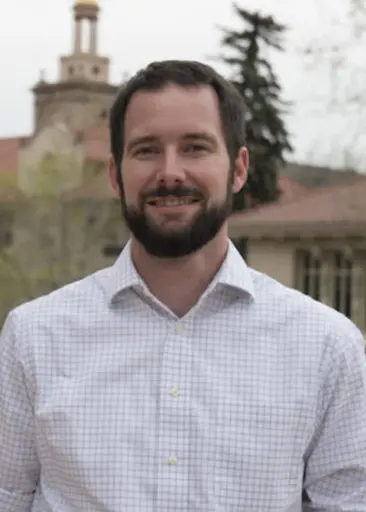The plummeting cost of renewable energy sources such as photovoltaic solar and wind has, not surprisingly, prompted more individuals and businesses to rely on them.
However, this growing use of renewables poses challenges for the electric grid. The variable nature of photovoltaic solar and wind can damage grid components and cause power outages if the grid is unable to adequately manage the increasingly dominant power fluctuations that occur when a cloud blocks the sun or the wind stops blowing.
 Michael Wagner
Michael Wagner
“The ultimate goal is to enable 100% renewable electricity on the grid, but to do that we need to figure out a way to operate dispatchable energy technologies on the grid to accommodate the variable renewables,” says Michael Wagner, who joined the University of Wisconsin-Madison Department of Mechanical Engineering as an assistant professor in August 2020.
Wagner is working to address this challenge in his research, which aims to improve the operation of utility-scale electricity generation technologies and optimize energy dispatch to allow more renewables to be incorporated into the grid. He also works to design better renewable energy technologies.
Wagner’s expertise is in modeling and simulating energy systems. He develops time series simulation models to characterize the performance of energy generation technologies. Then he combines those simulation tools with modeling techniques from the field of optimization to make better decisions about renewable technology operations and design.
For instance, when a cloud moves across a field of photovoltaic panels and causes a sudden drop in power generation, is it more cost effective to quickly ramp up a turbine (which can cause more wear and tear in the long term, shortening the life of the turbine) or to ramp up the turbine at a slower rate and use supplemental battery storage to cover the energy shortfall?
“My work involves creating algorithms that will automatically make those decisions for you to achieve optimal operation of the energy system, taking into account the technical and economic factors,” Wagner says. “Optimization algorithms are commonly used in operations research for many applications ranging from logistics to healthcare, but they haven’t really been used much by mechanical engineers. So I’m trying to bring optimization methods into mechanical engineering research areas.”
Previously, Wagner worked as a senior research engineer in the Thermal Sciences group at the National Renewable Energy Lab (NREL). He earned his bachelor’s and master’s degrees in mechanical engineering at UW-Madison, and his PhD from the Colorado School of Mines.
In 2019, Wagner received the prestigious Presidential Early Career Award for Scientists and Engineers (PECASE) for his achievements at NREL. The PECASE award recognized Wagner for leading laboratory and academic teams in high-temperature materials, applied mathematics, systems optimization, and power plant modeling to answer fundamental questions on the capability and grid value of concentrating solar power.
At UW-Madison, he plans to continue research on concentrating solar power, among other areas. Concentrating solar technology collects heat from sunlight, which it uses to produce steam to power a turbine for electricity generation. That thermal energy can be stored in hot fluid for long periods of time. “Concentrating solar has energy storage built into it, and that stored energy is dispatchable, meaning we can make some decisions about how it’s used. That gives us some flexibility,” Wagner says.
Wagner is investigating how photovoltaic technology (low cost but not dispatchable) could be coupled with concentrating solar power (higher cost but offers flexibility in dispatching stored energy) to leverage the benefits of each technology. “There may be a way to combine those two technologies into a hybrid system that offers overall reduced costs but still has the same level of reliability and dispatchability as the more expensive concentrating solar technology by itself,” he says.
In addition, Wagner is currently working on a research project aimed at integrating concentrating solar power into a nuclear lead-cooled fast reactor system, which adds dispatchability to nuclear plants by using molten salt thermal energy storage.
Wagner is excited to return to his alma mater as a faculty member, and he says UW-Madison’s outstanding reputation for research and education made the decision to move to Madison an easy one. “In addition to all the great opportunities for multidisciplinary research collaboration at UW-Madison, I’m looking forward to working with students and helping them develop as engineers,” he says.